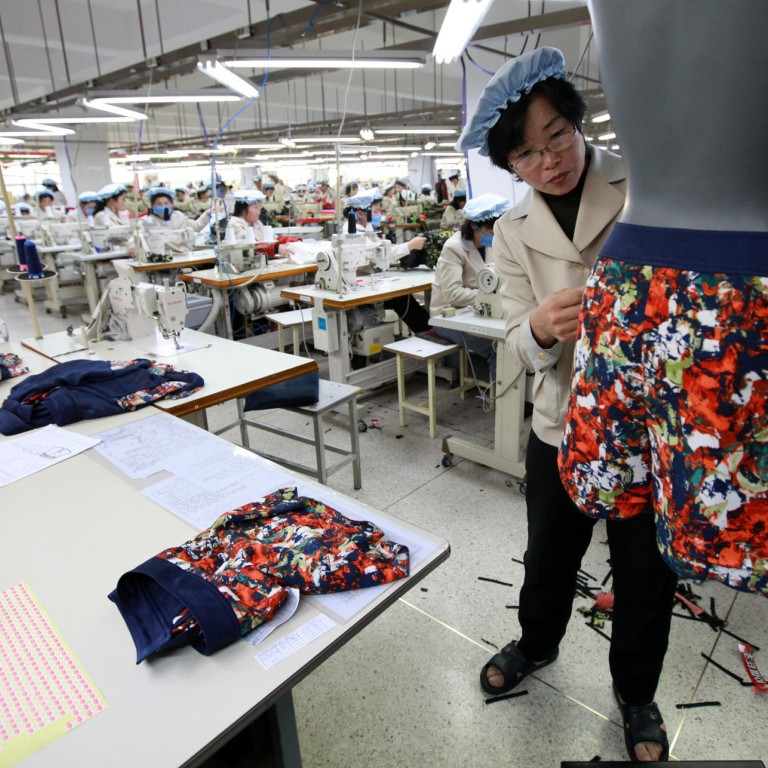
A glimpse inside Kaesong, North Korea's curious capitalist outpost
Kaesong offers chance of global deals for South and blueprint for economic rejuvenation in North
In an impoverished nation, and just a few minutes' drive from the world's most heavily armed border, stands an unlikely outpost of capitalism.
The Kaesong industrial complex inside North Korea is a critical asset for South Korea.
At a time when Chinese are free to invest in North Korea, sparking some fears in Seoul of economic colonisation, Kaesong represents the South's only economic foothold inside its estranged neighbour.
It also represents a blueprint for the possible rejuvenation of the North Korean economy if political tensions ease. But it is no easy place to do business.
Established in 2003, it covers 330 hectares and is occupied by 123 small South Korean companies which employ 53,000 North Koreans, working for about US$160 per month.
It has weathered many political storms, but was closed amid inter-Korean tensions in April. After negotiations, it reopened on September 16.
On Thursday, 30 delegates to the G20 conference in Seoul, along with a posse of reporters, visited the zone which South Korea hopes will start to attract foreign investment.
That same day, inter-Korean talks were held regarding Kaesong's hoped-for globalisation.
Inside the complex's fenced-off perimeter, its four-lane roads are largely empty. The complex is back-dropped by snow-covered ridges that reflect the chilly state of inter-Korean relations, but the South Korean-built buildings are all modern. There are no power outages. Seoul supplies the electricity, via pylons that march across the demilitarised zone. It also funds the fire station, medical clinic and water facilities.
South Korean Hong Yangho, head of the management committee, was upbeat as he outlined Kaesong's benefits for foreign firms - affordable infrastructure, skilled labour, tax benefits, low logistics costs and even South Korean government funding.
But he admitted that potential foreign investors had serious concerns over transport, with visits requiring three-days' notice. Also problematic were the issues of lengthy customs clearance times and unreliable communications, with Kaesong lacking internet and mobile access. Hong said negotiations with Northern officials had generated movement on the first two points, but none on the last.
The delegation saw hundreds of North Korean workers sewing in two brightly lit factories making shoes and clothing.
Most were camera-shy and declined to speak, but Lee Yang-hee, a female North Korean worker, said there had been no fallout from Pyongyang since the leader Kim Jong-un had his once-powerful uncle Jang Song-thaek executed last week.
"The people of North Korea are good and they are doing their best," she said.
Cultural differences are minimal. "Since we are the same folk, we are able to communicate in Korean and are very comfortable," said Kim Chun-lim, an affable North Korean official.
But not everyone is convinced by Kaesong's pitch. "This is an authoritarian regime with a very nasty way of punishing anybody ... who is against the regime," said Paola Subacchi, of the Chatham House policy institute in London.
"There's no transparency, no accountability, nothing that could make an international investor happy and willing to invest." But Subacchi said the complex's expansion might bring positive changes to North Korea because it would provide jobs and help feed North Korean workers and their families.
Already open a decade, Kaesong covers only 40 per cent of its planned area and no South Korean flagship firm has invested.
Meanwhile, with Pyongyang having announced 14 other special economic zones - most likely, luring Chinese investors - Kaesong offers lessons.
"For us, it's important as a symbol of reconciliation and peace, but it's a very expensive investment - we have to do everything for North Korea," said Choi Jin-wook of Seoul's Korea Institute of National Unification.
"It is very difficult for China to open a special economic zone in North Korea."
